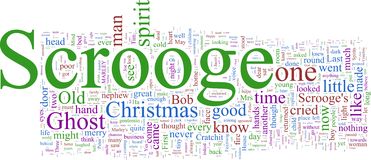(单词翻译:单击)
听力文本
Hello! And welcome to the VOA Learning English program Words and Their Stories.
It is the holiday season in many parts of the world. Christmas is one of the most celebrated of those holidays. But even for those who do not celebrate Christmas, Christmas movies have become an American tradition.
Many fun expressions come from these movies. When Americans hear these expressions, they know exactly what they mean and the movies they come from.
On today's show, we will explore two words that come from one of the most popular Christmas stories made into a movie: "A Christmas Carol." Writer Charles Dickens wrote "A Christmas Carol" in 1843. Ebenezer Scrooge is the main character of the story.
Scrooge is one of the most famous characters in English literature. And, the English language gained two words from "A Christmas Carol."
The first is simply the character's name: Scrooge. Ebenezer Scrooge is mean. He is unwilling to share his money and good fortune. He hates people. And he hates Christmas.
In the English language, a scrooge – with a lowercase "s" – is a person who is unwilling to give to others. Others words with the same meaning are miserly and stingy.
Scrooges are selfish, and not just at Christmas time or the holidays. Here is an example sentence:
"Her father is such a scrooge. He will not pay for her college tuition even though he has tons of money!"

That father is a first-rate scrooge!
Now back to "A Christmas Carol." At the beginning of the story, Scrooge is a cold-hearted miser who hates Christmas.
Dickens describes Scrooge in this way:
"The cold within him froze his old features, nipped his pointed nose, made his eyes red, his thin lips blue, and spoke out shrewdly in his grating voice ..."
How much does Scrooge hate Christmas? This passage from the book describes how much.
"If I could work my will," said Scrooge indignantly, "every idiot who goes about with 'Merry Christmas' on his lips, should be boiled with his own pudding, and buried with a stake of holly through his heart."
This quote makes perfectly clear that Scrooge hates Christmas and all that it represents -- namely goodwill to fellow humans.
Scrooges' catchphrase in the book and in the movies is "bah humbug!" As soon as you say "bah humbug" people know which story and which character you are talking about.
"Bah humbug" is usually used as a response to someone else's Christmas cheer. For example, if someone asks you, "So, are you ready for Christmas?" and you say, "Christmas ... bah humbug!" that means you are not in the Christmas spirit and are probably not going to celebrate.
Anyone who says "bah humbug" is rejecting or showing disgust for Christmas. Sometimes it is said in fun. Sometimes it is not.
The story of "A Christmas Carol" is one of personal change, of turning over a new leaf, to use an idiom.
As the story goes, the hateful Scrooge is visited one night by three Ghosts of Christmas: Ghost of Christmas Past, Ghost of Christmas Present and Ghost of Christmas Yet to Come.
The ghosts educate Scrooge and the last lesson is terrifying.
But it works. Scrooge greets the new morning as a generous, kind person.
However, word history does not remember him that way. His name will live on to mean the exact opposite.
That's language. And that's another Words and Their Stories. I'm Anna Matteo.
重点解析
1.unwilling to do 不愿意去做
What part of our plan are we each unwilling to change?
在我们的计划中,有哪部分是我们各自不愿意改变的?
2.tons of money 很多钱
We've lost just tons of money.
我们之前亏损了很多钱。
3.on one's lips 挂在嘴边
But to the wicked, God says: 'What right have you to recite my laws or take my covenant on your lips?'
但神对恶人说,你怎敢传说我的律例,口中提到我的约呢?
4.bah humbug 呸,骗子!
Bah humbug! I love Christmas, but the shopping has got to go.
呸,都是骗子!我喜欢圣诞节,但购物可就免了吧。
参考译文
欢迎收听VOA学英语《词汇掌故》节目。
世界上很多地方现在都是假日季节。圣诞节是其中最有名的一个节日。但是即使对那些不庆祝圣诞节的人来说,圣诞电影也已经成为一种美国传统。
许多有趣的表达都来自于这些电影。当美国人听到这些表达时,他们确切地知道它们是什么意思以及出自哪部电影。
在今天的节目中,我们将会探讨两个词语,它们来自于一个最著名的圣诞故事拍成的电影:《圣诞颂歌》。作家查尔斯·狄更斯在1843年撰写了《圣诞颂歌》这部作品。艾柏纳泽·斯克鲁奇是这个故事的主角。
斯克鲁奇是英国文学中最知名的人物之一。而且,英语从《圣诞颂歌》这部电影中获得了两个词语。
第一个词语就是这个主角的名字,斯克鲁奇。艾柏纳泽·斯克鲁奇很吝啬。他不愿意分享他的钱财和好运。他讨厌人们,也讨厌圣诞节。
在英语中,首字母小写的scrooge这个词是指不愿意付出的人,和它意思相同的单词有miserly和stingy。
吝啬鬼们都很自私,而且不仅仅是在圣诞或节日期间。以下是一个例句:
“她父亲如此吝啬,虽然他很有钱但是不愿意给她付大学学费。”
这个父亲就是头等吝啬鬼。
现在回到《圣诞颂歌》这部作品。在故事伊始,斯克鲁奇就是一个不喜欢圣诞节的冷血守财奴。
狄更斯这样描述斯克鲁奇:
“他内心冷若冰霜,冻僵了他年迈的面孔,冻伤了他的尖鼻梁,冻红了他的眼睛,把他薄薄的嘴唇也冻成青紫色了,他说话冰冷,尖声刺耳。”
斯克鲁奇有多讨厌圣诞节?书中的这段话如此描述:
斯克鲁奇愤怒地说,“在我看来,那些把“圣诞快乐”挂在嘴边的人都应该去死,然后埋在土里,让圣诞树穿心而过!”
这句话非常清楚地表明,斯克鲁奇讨厌圣诞节以及它代表的对人类的善意。
斯克鲁奇在这本书以及电影中的口头禅是“呸,骗人的鬼话!”你一说“bah humbug”人们就知道你说的是什么。
“Bah humbug”通常用于对他人圣诞气氛的回应。例如,如果有人问你,“你准备怎么过圣诞节?”而你就回答,“圣诞节都是骗人的鬼话。”意思是你不过圣诞节并且可能不会去庆祝。
任何人说“bah humbug”就是拒绝或对圣诞节表示厌恶。有时候是说着好玩,有时候却并非如此。
《圣诞颂歌》这个故事是指一种个人变化或翻开新的一页。
随着故事推移,可恨的斯克鲁奇某晚被三位圣诞鬼魂造访,他们分别是过去的圣诞鬼魂,现在的圣诞鬼魂以及将来的圣诞鬼魂。
这些鬼魂教育了斯克鲁奇,而且最后一课很可怕。
但是它奏效了。斯克鲁奇作为一个慷慨善良的人迎来的一个新的早晨。
然后,词语历史并未以这样铭记它。他的名字将一直意味着相反的意思。
这就是语言。那是另一期《词汇掌故》节目了。我是安娜·马特奥。


